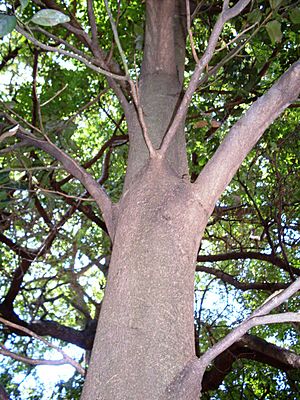Cryptocarya foetida facts for kids
Quick facts for kids Cryptocarya foetida |
|
|---|---|
 |
|
| Stinking laurel | |
| Conservation status | |
| Scientific classification |
|
| Kingdom: | Plantae |
| Clade: | Tracheophytes |
| Clade: | Angiosperms |
| Clade: | Magnoliids |
| Order: | Laurales |
| Family: | Lauraceae |
| Genus: | Cryptocarya |
| Species: |
C. foetida
|
| Binomial name | |
| Cryptocarya foetida R.T.Baker
|
|
| Script error: The function "autoWithCaption" does not exist. | |
Script error: No such module "Check for conflicting parameters".
The Cryptocarya foetida is a special kind of tree that grows in the rainforests along the eastern coast of Australia. It's often called the stinking cryptocarya or stinking laurel because its flowers are said to have a strong, unusual smell. This tree is quite rare and is considered a vulnerable species, meaning it's at risk of disappearing forever.
Where it Lives
This tree likes to grow in rainforests right by the coast, especially on sandy soil. You can find it between Iluka in New South Wales and Fraser Island in Queensland. Sadly, a lot of the places where Cryptocarya foetida used to grow have been destroyed. This happened because of repeated fires and land being cleared to build houses and other developments near the beach.
What it Looks Like
The Cryptocarya foetida is a small to medium-sized tree. It can grow up to 20 metres (about 65 feet) tall. Its top part, called the crown, is a dark green color.
Its trunk is greyish-brown and has small cracks. It's mostly straight and doesn't have big roots sticking out at the bottom.
Leaves
The leaves of this tree look like those of many other Australian laurel trees. They grow one after another along the stem. Each leaf is simple, meaning it's not divided into smaller leaflets. They are thick, smooth, and shiny, with clear edges. The leaves are shaped like an oval or a spearhead, usually 8 to 13 centimetres (about 3 to 5 inches) long. You can easily see the yellowish veins, especially on the underside of the leaf.
Flowers and Fruit
Cream-colored flowers appear on the tree during the summer months. These are the flowers that give the tree its "stinking" name due to their strong smell.
The fruit ripens in winter. It's a round, purplish-black fruit, about 8 to 10 millimetres (less than half an inch) wide. This type of fruit is called a drupe, which means it has a hard pit inside. For the seeds to grow well, it's best to remove the fleshy outer part of the fruit before planting.
Gallery
 | Aurelia Browder |
 | Nannie Helen Burroughs |
 | Michelle Alexander |





